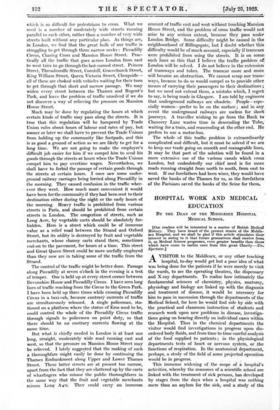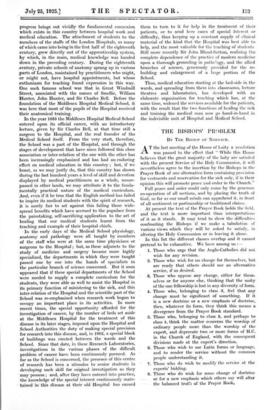HOSPITAL WORK AND MEDICAL EDUCATION BY THE DEAN OF THE
MIDDLESEX HOSPITAL MEDICAL SCHOOL.
[Our readers will be interested in a matter of British Medical History. They have heard of the present straits of the Middle- Sex Hospital, and we shall be glad if this article stimulates their interest in seeing to it that future generations shall receive from, it, as Medical Science progresses, even greater benefits than those which have come to earlier ones from this great Charity.—En.: Spectator.]
AVISITOR to the Middlesex, or any other teaching hospital, to-day would get but a poor idea of what was being done for the patients if he were merely to visit the wards, to see the operating theatres, the dispensary and X-ray departments. To realize how intimately the fundamental sciences of chemistry, physics, anatomy, physiology and biology are linked up with the diagnosis and treatment of disease, it would be necessary for him to pass in succession through the departments of the Medical School, for here he would find side by side with the practical and classroom instruction of students and research work upon new problems in disease, investiga- tions going on bearing directly on individual cases within the Hospital. Thus in the chemical, departments the visitor would find investigations in progress upon dis- ordered body fluids, and from time to time careful analysis of the food supplied to patients ; in the physiological departments tests of heart or nervous system,_ or the functions of respiration. In the anatomical department; perhaps, a study of the field of some projected operation would be in progress.
This immense widening of . the • scope of a hospital's activities, -whereby the .resources of a scientific school are linked with the treatment of sick persons, has developed by stages from the days when a hospital was nothing -mere than an asylum for the sick, and a study of -the progress brings out vividly the fundamental connexion which exists in this country between hospital work and medical education. The attachment of students to the members of the staffs of the London Hospitals, so many of which came into being in the first half of the eighteenth century, grew directly out of the apprenticeship system, by which, in the main, medical knowledge was handed down in the preceding century. During the eighteenth century, private schools of anatomy sprang up in various parts of London, maintained by practitioners who might, or might not, have hospital appointments, but whose :enthusiasm for teaching found expression in this way. One such famous school was that in Great Windmill Street, associated with the names of Smellie, William Hunter, John Hunter, and Sir Charles Bell. Before the foundation of the Middlesex Hospital Medical School, it was here that most of the pupils of the Hospital received their anatomical training.
In the year 1885 the Middlesex Hospital Medical School entered upon its official career, with an introductory lecture, given by Sir Charles Bell, at that time still a surgeon to the Hospital, and the real founder of the Medical School itself. From the very start, therefore, the School was a part of the Hospital, and through the stages of development that have since followed this close association or inter-relation of the one with the other has been increasingly emphasized and has had an enduring effect on medical education in this country ; but, if we boast, as we may justly do, that this country has shown during the last hundred years a level of skill and devotion displayed by medical practitioners as a whole, unsur- passed in other lands, we may attribute it to the funda- mentally practical nature of the medical curriculum. 'And, even if it be true that the English method has failed to inspire its medical students with the spirit of research, it is surely fair to set against this failing those wide- spread benefits which have accrued to the populace from the painstaking, self-sacrificing application to the art of healing that our medical students learnt from the .teaching and example of their hospital chiefs.
In the early days of the Medical School 'physiology, .anatomy and pathology were all taught by members of the staff who were at the same time physicians or surgeons to the Hospital ; but, as these adjuncts to the study of medicine and surgery became more highly specialized, the departments in which they were taught passed one by one into the hands of specialists in the particular branch of science concerned. But it soon appeared that if these special departments of the School were needed to supply a complete curriculum for the students, they were able as well to assist the Hospital in its primary function of ministering to the sick, and this inter-relation of the Hospital and the scientific part of the School was re-emphasized when research work began to occupy an important place in its activities. In more recent times, the special opportunity afforded for the investigation of cancer, by the number of beds set aside at the Middlesex Hospital for the treatment of this disease in its later stages, imposed upon the Hospital and School Authorities the duty of making special provision for research into this disease, aid, in 1902, a special block of buildings was erected between the wards and the School. Since that date, in these Research Laboratories, investigations in the various phases of the difficult problem of cancer have been continuously pursued. As far as the School is concerned, the presence of this centre of research has been a stimulus to senior students in developing such skill for original investigation as they may possess ; and, after they have entered into practice, the knowledge of the special interest continuously main- - tabled in this disease at their old Hospital –has caused them to turn to it for help in the treatment of their patients, or to send here cases of special Interest or difficulty, thus keeping up a constant supply of clinical material of the kind that the Hospital was best able to help, and the most valuable for the teaching of students. Still more recently Sir John Bland-Sutton, realizing the complete dependence of the practice of modern medicine upon a thorough grounding in pathology, and the allied branches of science, generously provided for the re- building and enlargement of a large portion of the School.
Thus, medical education starting at the bed-side in the wards, and spreading from them into classrooms, lecture theatres and laboratories, has developed with an elaborate organization for teaching which has, at the same time, widened the services available for the patients, with the result that the two functions of healing the sick and training the medical man now go hand-in-hand in the indivisible unit of Hospital and Medical School.



























































 Previous page
Previous page